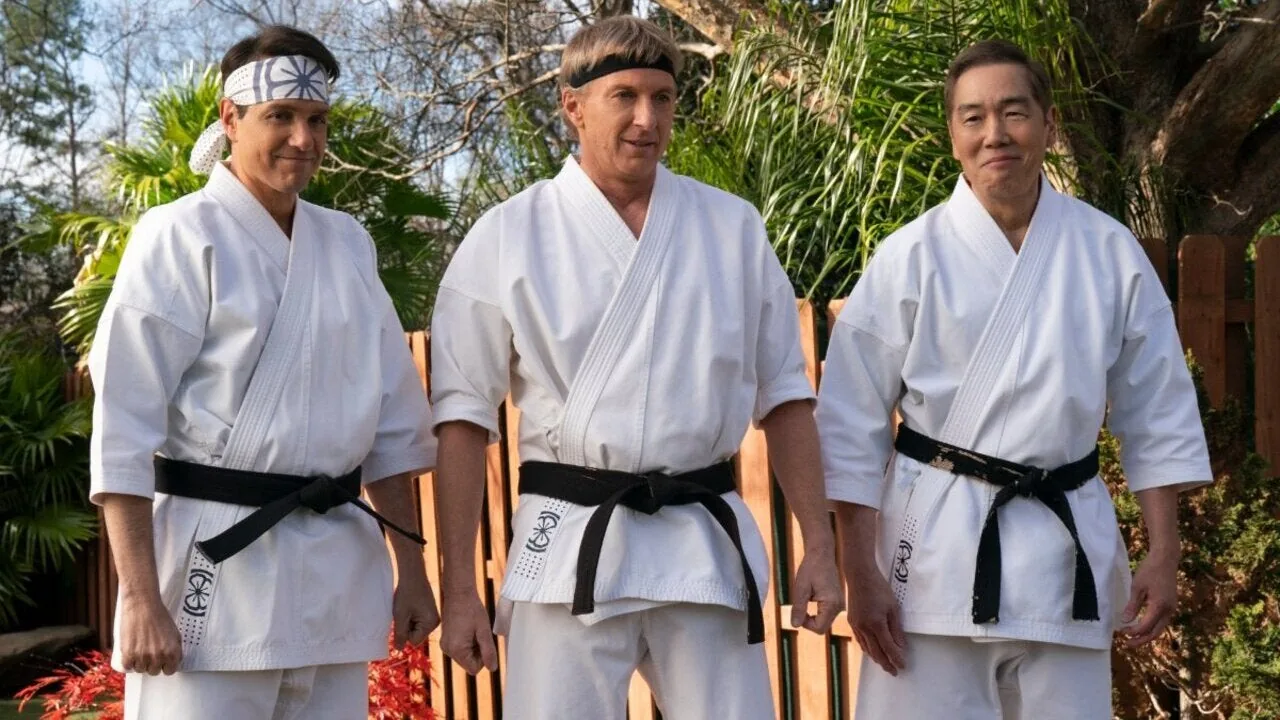The phrase “sweep the leg” may trigger intense flashbacks for anyone who grew up with the Karate Kid films. Decades after Daniel LaRusso crane-kicked his way into pop culture history, Cobra Kai storms in with a bold new vision. This hit Netflix series isn’t just a throwback—it’s a modern revival that flips the original script while honoring the past.
In this in-depth Cobra Kai review, we’ll break down what makes the show tick—its characters, storytelling, nostalgia, and relevance—and whether it’s truly worth the binge.
The Legacy of The Karate Kid Lives On
Back in 1984, The Karate Kid introduced us to underdog Daniel LaRusso, his wise mentor Mr. Miyagi, and the ruthless dojo Cobra Kai. Fast forward 30+ years, and Cobra Kai reawakens that universe—only this time, we see it through a surprising lens: Johnny Lawrence’s.
Johnny, once the villain, is now a washed-up handyman haunted by his past. Struggling with unemployment, alcoholism, and regret, he decides to reopen the Cobra Kai dojo—not to destroy Daniel, but to find purpose. This twist is what initially grabs your attention. But it’s the nuanced writing and character growth that keeps you watching.
A Role Reversal That Actually Works
One of the most compelling parts of Cobra Kai is its moral grayness. The show abandons the black-and-white hero/villain archetype. Johnny isn’t evil—he’s broken, misunderstood, and stuck in a different time. Daniel, now a successful car dealer, seems to have it all. But beneath the surface, he’s struggling to raise a teenager, balance work-life pressures, and hold onto his identity without Mr. Miyagi.
This reversal gives the show emotional depth and drives much of its tension. Who do you root for? It changes episode by episode, and that’s what makes Cobra Kai feel real.
Teen Drama Meets Classic Karate Rivalry
While the legacy characters draw in older fans, Cobra Kai also introduces a dynamic young cast. Miguel (played by Xolo Maridueña), Hawk (Jacob Bertrand), and Samantha LaRusso (Mary Mouser) bring new life to the series. Their stories intertwine with the adult drama, echoing the themes of the original films—bullying, loyalty, first love, and redemption.
These teen arcs aren’t just filler. They mirror the past, creating emotional parallels that enrich the narrative. Miguel’s journey from bullied teen to Cobra Kai’s star student feels like a modern-day Daniel LaRusso—but this time, under Johnny’s guidance.
Fight Scenes That Deliver
Let’s be honest: You can’t have a karate show without great fight scenes. Cobra Kai delivers big-time. The choreography blends old-school martial arts with fluid, high-impact sequences. Whether it’s school hallway brawls, dojo showdowns, or tournament finales, every punch feels earned.
But unlike many action series, these fights serve the story. They’re not just spectacles—they show us how characters evolve. When Hawk unleashes rage in the dojo, it’s more than just violence; it’s a reflection of his internal war.
The Season 2 finale, in particular, is a chaotic ballet of emotion and brutality that leaves lasting consequences—setting the stage for an even darker third season.
Nostalgia Done Right
Nostalgia can be a double-edged sword in TV. Too much, and it feels like fan service. Too little, and you lose the emotional tie-ins. Cobra Kai walks this line with near-perfect balance.
From flashbacks of Mr. Miyagi to musical callbacks like “You’re the Best,” the show makes nods to the original films without living in their shadow. Even old rivals like Chozen and Terry Silver return, not as gimmicks, but as powerful plot drivers. These appearances deepen the emotional impact, especially for fans of the original trilogy.
Exploring Generational Trauma and Redemption
Beyond karate chops and rivalries, Cobra Kai offers something deeper: an exploration of trauma, legacy, and redemption. Johnny and Daniel are products of their upbringing, scarred by absentee mentors, aggressive ideologies, and unresolved anger. Their sons—Robby and Miguel—carry these burdens, creating cycles of hurt that mirror real-world generational struggles.
This emotional core separates Cobra Kai from most action-dramas. It’s not just about kicks and tournaments; it’s about learning how to be better, even when you were taught wrong.
Cobra Kai Review: A Masterclass in Storytelling and Pacing
Let’s take a closer look at the structure and writing of the show in this cobra kai review. The pacing is snappy, rarely dragging across its five current seasons. Each episode ends with a mini cliffhanger, often teasing confrontations, alliances, or emotional breakthroughs.
Writers Josh Heald, Jon Hurwitz, and Hayden Schlossberg clearly understand the Karate Kid universe. But they also know how to make it relevant to modern audiences—tackling themes like toxic masculinity, peer pressure, internet culture, and broken families.
Perhaps what’s most impressive is how the show respects every character’s arc. There are no true heroes or villains. Just people trying—and failing, and learning—to grow.
Performances That Feel Authentic
William Zabka’s performance as Johnny Lawrence is the soul of Cobra Kai. His mix of crude humor, vulnerability, and tough love makes him endlessly watchable. He captures the pain of a man who peaked in high school and now seeks redemption—not through violence, but by mentoring a new generation.
Ralph Macchio slips comfortably back into Daniel’s shoes, bringing a polished but occasionally arrogant version of the character. The friction between Johnny and Daniel is magnetic; it’s part bromance, part Cold War.
Among the younger cast, Xolo Maridueña stands out. Miguel’s transformation from timid teen to fierce fighter—and then back to compassionate leader—shows remarkable range. Peyton List (Tory) and Tanner Buchanan (Robby) also deserve praise for portraying conflicted youth caught in adult battles.
Cultural Relevance and Modern Appeal
Another reason for the show’s continued success is its adaptability. Cobra Kai started on YouTube Red, then blew up after moving to Netflix. Its cross-generational appeal is rare: Gen Xers tune in for nostalgia; Millennials and Gen Z relate to the teen drama and fresh themes.
In a world where superhero fatigue is real, Cobra Kai offers something grounded. It’s emotional action-drama with heart, set in a world of middle-class suburbia, high school cafeterias, and strip mall dojos. No superpowers. Just bruised knuckles and complicated pasts.
Room to Grow: What the Future Holds
As of Season 5, the stakes have never been higher. With international tournaments, fractured friendships, and rival dojos forming alliances, the scope is expanding. But will Cobra Kai maintain its grounded feel as it grows?
There’s always a risk in stretching a franchise too far. But so far, the showrunners have proven they know where the heart of the story lies—in flawed people trying to change. If they stick to that emotional truth, Cobra Kai can continue to strike first… and strike true.
Final Verdict – Why You Should Watch
In conclusion, Cobra Kai is far more than a nostalgia-fueled sequel series. It’s an intelligently written, emotionally layered drama that uses karate as a metaphor for self-growth. Whether you’re a lifelong Karate Kid fan or a total newcomer, this series offers compelling characters, meaningful arcs, and action that packs a punch.
It’s funny, raw, nostalgic, and timely all at once. Few revivals manage to blend past and present so seamlessly. In this cobra kai review, it’s clear: the show earns its black belt in storytelling.
FAQs
Is Cobra Kai suitable for kids?
The show is rated TV-14. It contains moderate violence, teen romance, and some mature themes. Parents might want to preview it for younger viewers.
Do I need to watch The Karate Kid movies before Cobra Kai?
Not necessarily, but it helps. The series includes helpful flashbacks, so newcomers can catch up quickly.
How many seasons are there of Cobra Kai?
As of now, there are five seasons available on Netflix, with a sixth and final season in production.
Who is the best character in Cobra Kai?
That’s subjective, but Johnny Lawrence often steals the show due to his layered personality and growth.
Is Cobra Kai based on real martial arts?
The show features stylized versions of karate but includes realistic elements. It’s dramatized for entertainment, not for training purposes.



